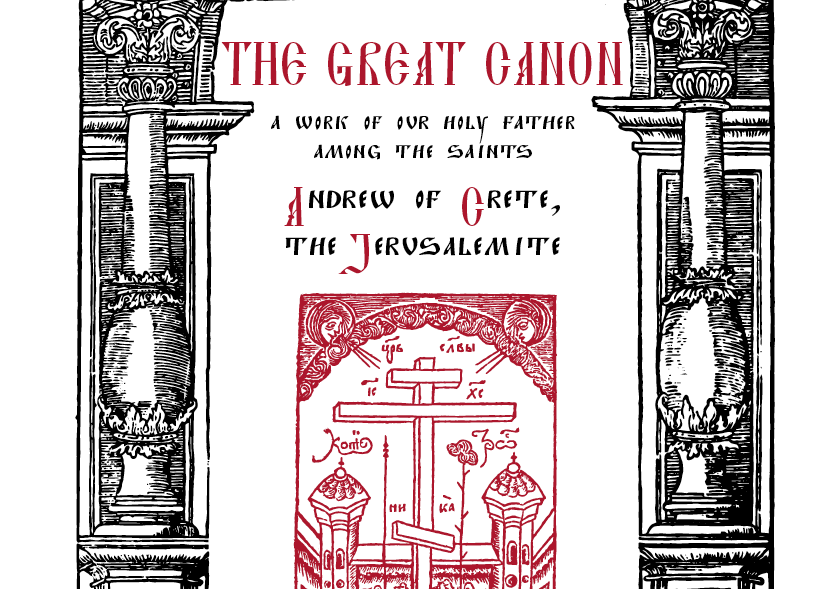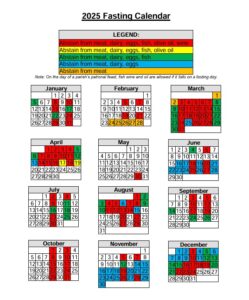Tonight at 6:30 pm we pray the first portion of the Great Canon of Repentance (composed by St. Andrew of Crete) during Great Compline. Social Distancing, Etc: We continue to observe simple social distancing norms, but for these weekday services there is no sign-up or assigned seating. Please use common sense when finding a place in the nave or balcony. If your schedule allows you to be present at church with us, please come and join us – live-streaming is good for those who can’t be personally present, but is a poor substitute for standing in the holy space of God’s house. That being said, if you can’t make it for some blessable reason, but you can tune-in to the live-stream on our Facebook page, then please do so. Reflection of Fr. Alexander Schmemann (+1983) [The Great Canon of St. Andrew of Crete] can best be described as a penitential lamentation conveying to us the scope and depth of sin, shaking the soul with despair, repentance, and hope. With a unique art, St. Andrew interwove the great biblical themes– Adam and Eve, Paradise and Fall, the Patriarchs Noah and the Flood, David, the Promised Land, and ultimately Christ and the Church– with confession of sin and repentance. The events of sacred history are revealed as events of my life, God’s acts in the past as acts aimed at me and my salvation, the tragedy of sin and betrayal as my personal tragedy. My life is shown to me as part of the great and all-embracing fight between God and the powers of darkness which rebel against Him. The Canon begins on this deeply personal note: Where shall I begin to weep over the cursed deeds of my life? What foundation shall I lay, Christ, for this lamentation? On after another, my sins are revealed in their deep connection with the continuous drama of man’s relation to God; the story of man’s fall is my story: I have made mine the crime of Adam; I know myself deprived of God, of the eternal Kingdom and of bliss because of my sins…. I have lost all divine gifts: I have defiled the vestment of my body, obscured the image and likeness of God…. I have darkened the beauty of my soul, I have torn my first vestment woven for me by the Creator and I am naked…. Thus…. the nine odes of the Canon tell me again and again the spiritual story of the world which is also my story. They challenge me with the decisive events and acts of the past whose meaning and power, however, are eternal because every human soul– unique and irreplaceable– moves, as it were, through the same drama, is faced with the same ultimate choices, discovers the same ultimate reality. Scriptural examples are more than mere “allegories” as many people think, and who therefore find this Canon too “overworked,” too loaded with irrelevant names and episodes. Why speak, they ask, of Cain and Abel, of David and Solomon, when it would be so much simpler just to say: “I have sinned”? …. It is precisely the function and the purpose of the Great Canon to reveal sin to us and to lead us thus to repentance, and it reveals sin not by definitions and enumerations but by a deep meditation on the great biblical story which is indeed the story of sin, repentance, and forgiveness. This meditation takes us into a different spiritual culture, challenges us with an entirely different view of man, of his life, his goals, and his motivation. It restores in us the fundamental spiritual framework within which repentance again becomes possible. When we hear for example, I have not assumed the righteousness of Abel, O Jesus, not having offered to thee either an acceptable gift, or divine deed, or pure sacrifice, or life immaculate…. we understand that the story of the first sacrifice so briefly mentioned in the Bible reveals something essential about our own life, about man himself. We understand that sin is first of all the rejection of life as offering or sacrifice to God, or in other terms, of the divine orientation of life; that sin therefore is in its roots the deviation of our love from its ultimate object. It is this revelation that makes it possible then to say something which is so deeply removed from our “modern” experience of life yet now becomes so “existentially” true: Filling dust with life, Thou hast given me flesh and bones, breathing in life; O Creator, Redeemer, and Judge: accept me repenting…. Adapted from Chapter 4 of Great Lent by Alexander Schmemann. |

Uncategorized
CALENDAR Great Lent thru Pascha
The following represents “the plan” for divine services during Great Lent 2025. Other activities are not included here. Note that most weekday services will be at 6:30 pm, but Presanctified


